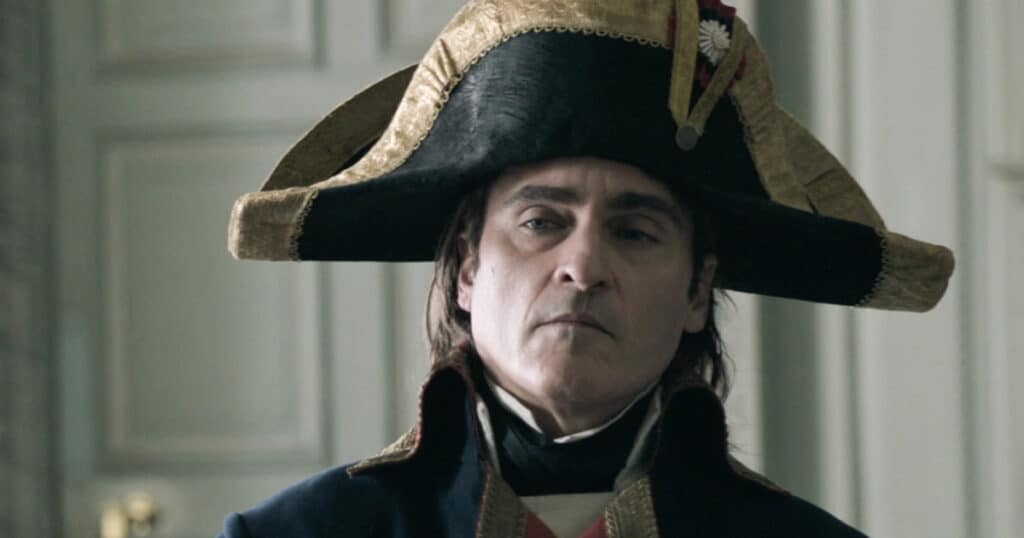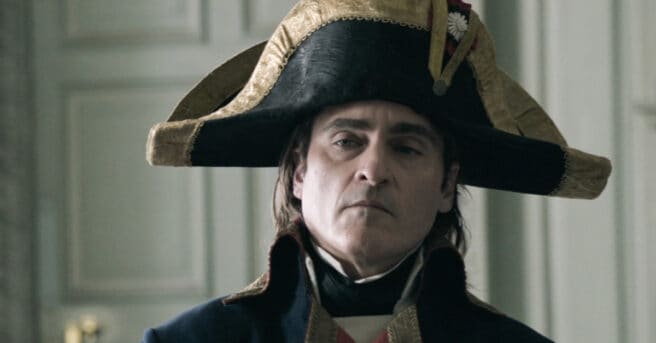Ridley Scott’s Napoleon is a sumptuous and surprisingly intimate epic sporting incredible acting by Joaquin Phoenix and Vanessa Kirby.
PLOT: The true story of Napoleon Bonaparte’s ruthless rise to power and his obsessive love for his first wife, Empress Josephine (Vanessa Kirby).
REVIEW: Napoleon has proven a formidable adversary for filmmakers to topple. No less than Stanley Kubrick tried and failed to mount a lavish Napoleon biopic, but other than the contained and costly Russian flop Waterloo and the silent Abel Gance movie, the infamous military commander has never gotten the big-budget epic he deserved. Leave it to Ridley Scott, at 85, to finally do what Kubrick couldn’t – make the definitive Napoleon movie.
Scott’s film, written by his All the Money in the World scribe David Scarpa, continues an interesting trend the director began with his underrated The Last Duel. It deconstructs the heroic myth of the epics Scott himself helped popularize, emphasizing the domestic affairs of his anti-heroes as much as the wars they wage. Joaquin Phoenix, who re-teams with Scott for the first time since Gladiator, makes for a formidable Napoleon. He’s able to expertly evoke not only the man’s brilliant tactics on the battlefield (and sheer ruthlessness) but also his deep insecurity as a man. He’s constantly foiled by ego and his desire to impress his beloved – but also despised – Josephine.
Their relationship is both poisonous and – at times -playful, with Phoenix and co-star Vanessa Kirby having terrific chemistry. Kirby’s superb in her role, holding her own with Phoenix and expertly portraying a woman who found it impossible to be faithful, was selfish and conniving, but also proved to be Napoleon’s match. Once he lost his Josephine, Napoleon was never the same, and their aggressive, poisonous love is something to behold.
Wisely, Scott keeps the movie evenly balanced between the battlefield and the parlours of France, with the domestic drama having a satiric bite that’s similar to The Last Duel, with a sex scene or two that owes more to MacGruber than any period romance you might have seen. Each half of the film is as successful as the other, with the battle sequences a marvel to behold. The Battle of Austerlitz, which the studio already released part of online, is masterfully done, as is the climax at Waterloo. Like Killers of the Flower Moon, this was made for Apple TV Plus but deserves to be seen theatrically, with it as lavishly mounted as any of his other epics.

My only issue with Napoleon is this – you can tell that this isn’t Ridley Scott’s definitive cut. It feels truncated, and hopefully, he releases the four-hour cut he’s been teasing to Apple TV like he promised because this is begging for a much longer version. One has to respect his decision to deliver a faster version of the film to theaters, but as a hardcore fan, I bet the extended cut is an ever-better movie (this tends to be the case for most of Scott’s recuts).
Even as it is through, Napoleon is one doozy of a historical epic, anchored by Phoenix and Kirby’s powerhouse performances. They dominate the film, and no other role in the movie is given the same kind of weight they are. Nonetheless, the ensemble cast is terrific, including Rupert Everett’s welcome comeback as Napoleon’s nemesis, The Duke of Wellington, Tahar Rahim and many more. The score by Martin Phipps is excellent, while the cinematography by Dariusz Wolski demands the canvas of an IMAX screen, which is how I was lucky enough to see this.
While the more extended version of Napoleon may wind up being one of Ridley Scott’s genuinely great films, the movie as it is should still be seen. Given how it was produced, it seems fated to meet its ultimate home on streaming. It’s further proof that even as he ages, Scott’s work is as vital as ever, and I hope he can keep making movies for years and years to come.


